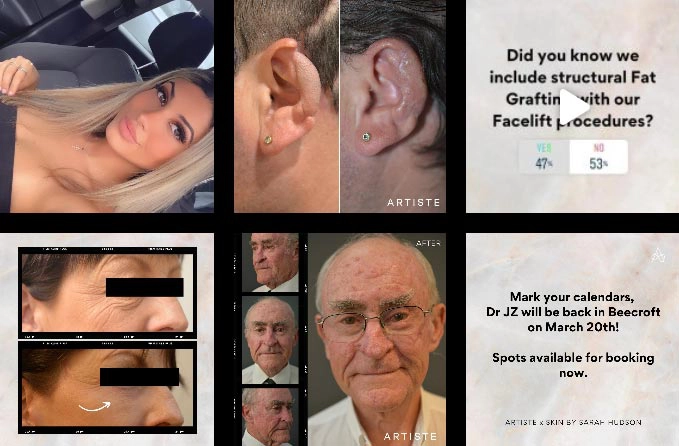Neck Lift Before & After Care
Model featured in photography

Disclaimer: Results vary and are illustrated as a guide only.
A neck lift, or lower rhytidectomy, is a cosmetic surgery aimed at addressing the visible signs of ageing in the jawline and neck. While the procedure may manage these skin ageing-related concerns, proper care before and after the neck lift surgery is crucial for supporting a smooth recovery. This guide covers the general steps and considerations for both the preparation and post-operative care of a neck lift.
For personalised advice, we strongly recommend consulting with your healthcare provider.
Preparing for a Neck Lift
This information is intended to help you prepare and understand general considerations around neck lift surgery. Every individual’s circumstances are unique, so it’s important to consult a qualified healthcare provider for personalised advice.
1. Consultation
- Choose a Qualified Surgeon: Ensure your surgeon is board-certified and has extensive experience in performing neck lifts.
- Discuss Your Goals: Clearly communicate your concerns, expectations and desired outcomes to your surgeon. Your surgeon should also discuss potential risks and complications associated with the procedure.
- Health Assessment: Your surgeon will review your medical history included in your GP referral and conduct a physical examination and BDD screening to assess your suitability for the procedure.
2. General Pre-Surgery Recommendations
- Stop Smoking: Smoking can impede healing and increase the risk of complications. Quit smoking at least six weeks before surgery.
- Avoid Certain Medications: Discuss any medications or supplements you are taking with your healthcare provider. They may advise you to avoid certain substances , such as aspirin or anti-inflammatory drugs to minimise risks during and after the procedure.
- Transportation and Support: Arrange for someone to drive you home after the procedure and assist you during the initial recovery period.
3. Preparing Your Home
- Recovery Area: Set up a comfortable recovery area with pillows, blankets, and all necessary supplies within easy reach.
- Stock Up on Supplies: Stock up on items such ice packs, gauze, prescribed medications, and easy-to-eat foods for convenience during recovery..
- Clothing: Prepare loose, comfortable clothing that is easy to put on and take off, preferably with front closures.
Post-Operative Care
This information serves as a general guide for post-procedure care. Recovery experiences and requirements vary for each individual, so it’s important to follow the personalised advice of your healthcare provider. If you have any questions or concerns, reach out to your practitioner for support.
1. Immediately After Surgery
- Rest: Prioritise rest and keep your head elevated that may help reduce swelling.
- Follow Surgeon’s Instructions: Adhere strictly to the post-operative care instructions provided by your surgeon.
- Manage Discomfort: Take prescribed pain relief medications as directed by your healthcare provider. Cooling measures, such as ice packs, may also help manage swelling and provide comfort.
2. Caring for the Treatment Area
- Keep Incisions Clean: Follow your surgeon’s guidelines for cleaning and caring for your incisions to maintain hygiene and support healing.
- Limit Movement: Avoid excessive neck movement to minimise strain on the treated area.
- Monitor for Complications: Be aware of signs that may require attention, such as increased redness, swelling, or discharge.Contact your healthcare provider promptly if you have any concerns.
3. Long-Term Care
- Attend Follow-Up Appointments: Regular check-ins with your healthcare provider are essential to monitor progress and address any concerns during recovery.
- Protect Your Skin: Use sunscreen and avoid prolonged sun exposure to protect the the treated area during the healing phase.
- Healthy Lifestyle: Maintain a healthy diet and stay hydrated to support the healing process.
4. Resuming Activities
- Gradual Return: Ease back into your normal activities as directed by your surgeon. Avoid strenuous activities and heavy lifting for the recommended period.
- Gentle Movement: Light activities, such as walking, may promote circulation. However, avoid vigorous exercise until your healthcare provider confirms it is safe to do so.
Proper preparation and diligent post-operative care are vital for supporting the healing process after a neck lift surgery. For those considering neck lift surgery in Sydney, reach out to Artiste Plastic Surgery, Our Specialist Plastic Surgeon, Dr Jack Zoumaras, will discuss your goals and concerns regarding the procedure and tailor a plan for you. Schedule an appointment today.
Disclaimer: At Artiste Plastic Surgery, our Plastic Surgeons led by Dr Jack Zoumaras have been trained to the highest possible degree. All surgery has risks and it is always advised to get a second opinion. Risks are very real and we cannot guarantee any result. Results are illustrated as a guide only. All risks are managed and any need for revision surgery or complications (1-5%) can be managed by our specialist plastic surgeons.
Any statements on how you will feel is based on Level V Evidence:
Level V: How you will feel after plastic surgery varies between individuals, depending on psychological and physical factors. Our internal research is based on how patients in our practice feel after surgery.
The blogs are not a substitute for a medical consultation and do not form as part of the doctor to patient relationship.
SHARE THIS ARTICLE
Jul01
Facelift Recovery Tips: What Speeds Up Healing and What to Avoid
Disclaimer: At Artiste Plastic Surgery, our Plastic Surgeons led by Dr Jack Zoumaras have been trained to the highest possible degree. All surgery has risks and it is always advised ...
Jul01
How to Prepare for Facelift Surgery: What to Do Before Your Big Day
Disclaimer: At Artiste Plastic Surgery, our Plastic Surgeons led by Dr Jack Zoumaras have been trained to the highest possible degree. All surgery has risks and it is always advised ...
ABOUT ARTISTE
Artiste Plastic Surgery is an Award Winning Specialist Plastic Surgery practice led by internationally trained Dr. Jack Zoumaras, Plastic Surgeon and Peer Reviewed Face Surgeon
Artiste offers the latest Cosmetic Surgical Procedures of the Face, Breast and Body, inspired from leading centres around the world.
STAY IN THE LOOP
Enter your email address below to receive updates on new articles and VIP access to promotions and special offers.
FOLLOW US ON INSTAGRAM










